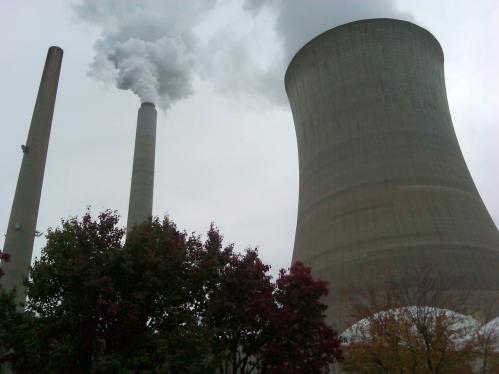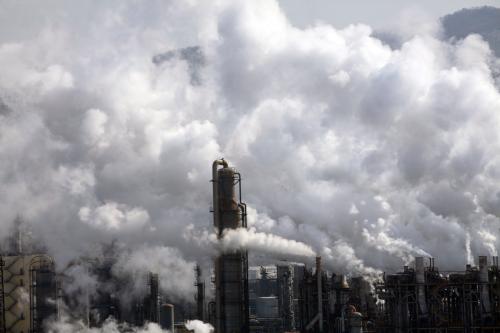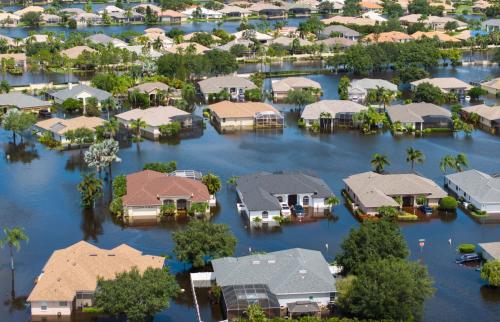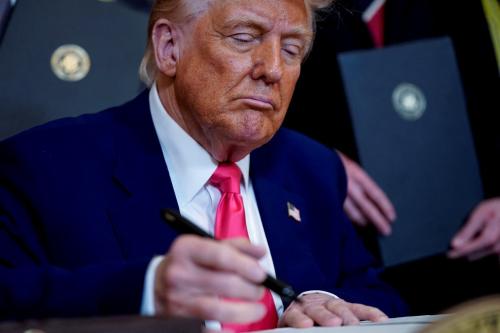President Donald Trump’s decision to withdraw from the Paris climate accord and related federal policy reversals reopens the question: how will states address an issue like climate change when they see federal disengagement? It also raises the question of how Americans want their state governments to respond. States have a range of policy options concerning energy production that have considerable consequences for their own greenhouse gas emissions, and several of them have pledged to adhere to the Paris Agreement regardless of the federal government’s approach to climate change. New survey data indicates that a majority of Americans believe that states have a responsibility to act.
In a new report from the National Surveys on Energy and Environment (NSEE), a joint effort from Muhlenberg College and the University of Michigan, 66 percent of respondents believe that if the federal government fails to address the issue of global warming, it is their state’s responsibility to address the problem. We have asked this question in past years and the new response reflects a significant increase from the 48 percent who agreed states should act when the question was last asked in 2013. Some of this is likely a reflection of more Americans now believing that climate change is occurring—70 percent of Americans say there is solid evidence of global warming now compared to 64 percent in Spring of 2013—and also exhibiting intensified concern over the issue of global warming.
It’s important to note that these specific results aren’t a direct reaction to withdrawal from the Paris Agreement—the survey was conducted before that decision was formally announced. Instead, respondents may have been reacting to the president’s executive order in March aimed at terminating the Clean Power Plan (which the NSEE has previously found to have a solid base of support among the public). Or they may have been reacting to his draft budget—also announced in March—which included significant cuts to federal grant programs that assist states with environmental protection, climate mitigation, and alternative energy development.
Either way, the survey finds clear—and bipartisan—support for states to take action on climate change. Over three-quarters (77 percent) of Democrats now say they believe it is their state’s responsibility to address global warming, a 20-point jump from 57 percent in 2013. Notably, a majority (51 percent) of Republicans now also agree that states should act, up from just 34 percent four years ago.
Figure 1: Agreement/Disagreement that States have a Responsibility to Address Climate Change Absent Federal Action, Spring 2013 vs. Spring 2017

While it is still unclear what specific policies states will consider to uphold their new pledges, the survey also finds strong support for renewable energy and energy efficiency mandates. More than half of the states currently have policies to reduce carbon emissions from the electricity sector using one or both of these approaches. Fully 81 percent of Americans support their state requiring increased energy efficiency standards, while 79 percent of Americans support their state requiring that an increasing amount of all electricity come from renewable energy sources. Support for renewable energy is even higher if you remove the context of a state-level mandate. An overwhelming 89 percent of these same survey respondents would support increasing the use of solar energy in their state, with 83 percent saying the same about wind energy.
Figure 2. Public support and opposition to clean state-level energy policy

Among all respondents, support for four types of policy interventions at the state level are high. But the responses from Americans who do not think global warming is occurring are surprising. While just over half support renewable energy mandates (51 percent) or energy efficiency standards (57 percent), a full two-thirds (67 percent) of those who do not think the climate is changing say they would support increasing the use of wind energy and nearly three-quarters (74 percent) support increasing solar energy in their state.
Figure 3. Public support and opposition to clean state-level energy policy, among those who do not think there is solid evidence that the average temperature on earth has been getting warmer over the past four decades (N = 155)

This high support for renewable energy technologies particularly among this group of Americans indicates the diverse factors driving renewable energy deployment across the country—economic motivations in particular. A majority of Americans (81 percent) believe wind and solar energy create jobs. The numbers are nearly as high among those who think there is no solid evidence that global warming is occurring: 70 percent believe solar energy creates jobs while 74 percent believe the same of wind energy. As many states have previously found, clean energy policies aimed at creating “green jobs” rather than “carbon-free energy” often appeal to a wider constituency.
Prior to the Obama era, states—rather than the federal government—drove U.S. climate policy adoption and implementation. This first glimpse into the views of the citizenry during the Trump Era of federal climate policy retraction would suggest a broad base of support for renewed state efforts on two well-established state-level policies to reduce greenhouse gas emissions. This should not necessarily be taken as carte blanche support for all state-level climate action. Previous NSEE surveys have found there are limits to the amount of price premium—if any—Americans are willing to pay for additional renewable energy. Furthermore, earlier surveys have found significantly less support for alternate policies such as cap-and-trade or a carbon tax, and outright majority opposition for some policy designs. As states begin to formulate new climate policy, future waves of the NSEE will continue to track support for specific policy designs under active consideration.
The Brookings Institution is committed to quality, independence, and impact.
We are supported by a diverse array of funders. In line with our values and policies, each Brookings publication represents the sole views of its author(s).










Commentary
Americans want states to pick up federal climate policy slack
June 20, 2017